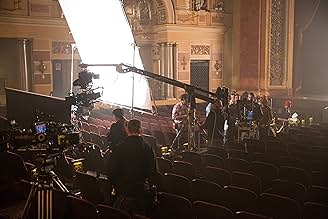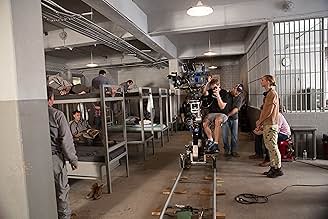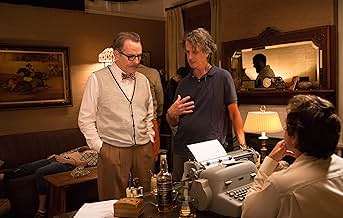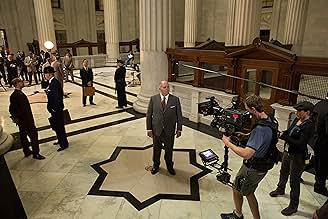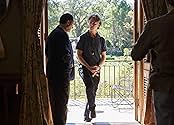In 1947, Dalton Trumbo was Hollywood's top screenwriter, until he and other artists were jailed and blacklisted for their political beliefs.In 1947, Dalton Trumbo was Hollywood's top screenwriter, until he and other artists were jailed and blacklisted for their political beliefs.In 1947, Dalton Trumbo was Hollywood's top screenwriter, until he and other artists were jailed and blacklisted for their political beliefs.
- Nominated for 1 Oscar
- 8 wins & 45 nominations total
Toby Nichols
- Chris Trumbo (age 6-10)
- (as Tobias McDowell Nichols)
- Director
- Writers
- All cast & crew
- Production, box office & more at IMDbPro
Featured reviews
All movie fans should recognize the name of Dalton Trumbo. Even if his heyday was a good half-century ago, his actions during one of Hollywood's very darkest periods still have tremendous impact even today. Especially today, for that matter.
Some quick background. You may recall that in World War II, the US and the Soviets were allies but that after the war we became distrustful adversaries. This time was known as the Cold War – since the two countries didn't fight one another – and really ended only in the late 1980s. Prior to the end of WW II, many Americans joined the Communist Party as a way to fight the rise of Fascism in Europe. After the war, current and former members of the Party were looked upon as pariahs of the highest order. Screenwriter Dalton Trumbo (Bryan Cranston) was one of these pariahs. It didn't help that he actively tried to rally technical workers on film sets (grips, lighting and sound technicians) to strike for higher pay. Unionizing was seen as a bad thing, despite the gains it had achieved for American workers earlier in the century.
Trumbo's membership in the Party wasn't a big deal at first, but then gossip columnist Hedda Hopper (Helen Mirren), who wielded an enormous amount of power in Hollywood, took it as a personal affront and used her column (and weekly appearance in newsreels) to denounce Communism in general and Trumbo in particular. Kicking the whole scandal into high gear was a little-known congressional group – the House Un-American Activities Committee. These guys tried to rout out Commies from Hollywood (which it saw as holding a lot of sway over Americans, much more so than today) by calling a group of known or suspected Communists to Washington for sworn testimony. These men were known as the Hollywood Ten. Trumbo was one of them, and he refused to tell the committee the names of anyone else who was or who could be a Communist. He, like his fellow Ten members, was found in contempt. Later, someone not in the group did name Trumbo, and he was put in prison for a full year.
When he got out, no one would hire him (or any of the others in the Ten). Except for King Brothers Studio, which couldn't pay him much. But Trumbo worked fast as both a writer of original stuff and a fixer of existing scripts. The Kings loved him. So much so that the others in the Ten were offered jobs (for no credit, same as Trumbo) working as script doctors. During this time, Trumbo also got work from some friendly sorts in the business by selling them a script but not taking on-screen credit; the credit typically went to a fictitious person, or to a willing accomplice – known as a front. Through this method, Trumbo won two writing Oscars – although no one knew it at the time.
Dalton Trumbo fought for himself, his fellow writers, and for anyone for whom the Bill of Rights holds any meaning. He reasoned that if people could be silenced for political beliefs, then anyone could be silenced for any reason. This is, unfortunately, still true today. And although he didn't receive credit at the time, Trumbo was awarded his Oscars eventually (one posthumously). He's recognized as being one of the very greatest screenwriters the world has ever known. The movie does a terrific job describing Trumbo's struggles – and that of his family: his wife Cleo (Diane Lane) and his three doting children. The toll that his stance took on them was noticeable to everyone except for Trumbo himself.
Cranston turns in what was an Oscar-nominated performance, but his was not the only one of note. Lane is superb as his suffering, strong better half. Elle Fanning, as his eldest daughter, is also a standout, as are John Goodman (as Frank King) and Alan Tudyk (as writer Ian McLellan Hunter). Spellbinding from start to finish, and all screenwriters owe Trumbo a huge debt of gratitude for his long struggle on their behalf.
Some quick background. You may recall that in World War II, the US and the Soviets were allies but that after the war we became distrustful adversaries. This time was known as the Cold War – since the two countries didn't fight one another – and really ended only in the late 1980s. Prior to the end of WW II, many Americans joined the Communist Party as a way to fight the rise of Fascism in Europe. After the war, current and former members of the Party were looked upon as pariahs of the highest order. Screenwriter Dalton Trumbo (Bryan Cranston) was one of these pariahs. It didn't help that he actively tried to rally technical workers on film sets (grips, lighting and sound technicians) to strike for higher pay. Unionizing was seen as a bad thing, despite the gains it had achieved for American workers earlier in the century.
Trumbo's membership in the Party wasn't a big deal at first, but then gossip columnist Hedda Hopper (Helen Mirren), who wielded an enormous amount of power in Hollywood, took it as a personal affront and used her column (and weekly appearance in newsreels) to denounce Communism in general and Trumbo in particular. Kicking the whole scandal into high gear was a little-known congressional group – the House Un-American Activities Committee. These guys tried to rout out Commies from Hollywood (which it saw as holding a lot of sway over Americans, much more so than today) by calling a group of known or suspected Communists to Washington for sworn testimony. These men were known as the Hollywood Ten. Trumbo was one of them, and he refused to tell the committee the names of anyone else who was or who could be a Communist. He, like his fellow Ten members, was found in contempt. Later, someone not in the group did name Trumbo, and he was put in prison for a full year.
When he got out, no one would hire him (or any of the others in the Ten). Except for King Brothers Studio, which couldn't pay him much. But Trumbo worked fast as both a writer of original stuff and a fixer of existing scripts. The Kings loved him. So much so that the others in the Ten were offered jobs (for no credit, same as Trumbo) working as script doctors. During this time, Trumbo also got work from some friendly sorts in the business by selling them a script but not taking on-screen credit; the credit typically went to a fictitious person, or to a willing accomplice – known as a front. Through this method, Trumbo won two writing Oscars – although no one knew it at the time.
Dalton Trumbo fought for himself, his fellow writers, and for anyone for whom the Bill of Rights holds any meaning. He reasoned that if people could be silenced for political beliefs, then anyone could be silenced for any reason. This is, unfortunately, still true today. And although he didn't receive credit at the time, Trumbo was awarded his Oscars eventually (one posthumously). He's recognized as being one of the very greatest screenwriters the world has ever known. The movie does a terrific job describing Trumbo's struggles – and that of his family: his wife Cleo (Diane Lane) and his three doting children. The toll that his stance took on them was noticeable to everyone except for Trumbo himself.
Cranston turns in what was an Oscar-nominated performance, but his was not the only one of note. Lane is superb as his suffering, strong better half. Elle Fanning, as his eldest daughter, is also a standout, as are John Goodman (as Frank King) and Alan Tudyk (as writer Ian McLellan Hunter). Spellbinding from start to finish, and all screenwriters owe Trumbo a huge debt of gratitude for his long struggle on their behalf.
I give this movie an 8 out of 10. I think, technically, it deserves a 6 or 7. It hinges on the modern notion that a biopic isn't complete unless we see all the nuances regarding the protagonist's family life. That is not necessarily the fault of the filmmakers. I don't think a picture can get funded if it doesn't adhere to these modern foibles. I give it an 8, however, and, for its purpose alone, it deserves a 10.
It takes guts to make a movie like this today.
In the United States, we tend to get comfortable and forget that the concept of freedom of speech is the most important idea any human being has ever put forth. We tend to forget that the powers that be don't like that idea.
They really, REALLY don't like that idea.
They want us lowly masses to be good little sheep and do what we're told and think exactly the way they want us to think. We tend to forget that fighting against that tendency of power is a struggle, a painful, sometimes lethal struggle. Folks in other countries know about it. They know all too well. That's why, in spite of all the other problems they may have with the U.S., they still want to live here.
But we've gotten lazy. Not only are there forces on the extreme right that would like to dictate how we live, think, and even breathe--now we have a warring faction from the left, seen most prominently on college campuses, that embraces censorship and the "shutting down" of alternative opinions like little McCarthys on methamphetamine. The concept of a "safe space," where no "offensive" opinions may be heard, is nothing short of censorship. Defenders of this nonsense often make the claim that the government is not getting involved, therefore, it's not a violation of the First Amendment. Here's what's wrong with that argument:
1. Remember our old friend Katherine Hepburn in Adam's Rib? In her closing arguments, she says the law has two parts--the letter and the spirit. It's true, by the letter of the law, students harassing and banning speakers on campus they don't agree with does not equal the federal government censoring those speakers. But it does violate the SPIRIT of the First Amendment. The government, as the film Trumbo clearly shows, cannot always be trusted to safeguard the LETTER of that particular law. It is up to us, We the People, to safeguard the SPIRIT of that law.
2. Trumbo shows us the horrific world where the government trampled on the First Amendment from the top down. What is happening on college campuses today is that violators of what is deemed "politically correct" (a phrase originating from Mao's Cultural Revolution, which should raise several alarms on that basis alone) are subjected to kangaroo courts on the campus, away from legitimate, LEGAL courts of law. They are harassed and humiliated (just as dissenters in the Cultural Revolution were) with no legal recourse. If this practice becomes accepted in normal society, we will have a political environment no different from the times depicted in the film. The only difference--this time, it we have started with the people and spread to a government ready and willing to enact "speech codes" for its own purposes.
By now, those who still, stubbornly, cling to the notion that there is nothing wrong with what is happening on college campuses today will have dismissed this review. They might even leave typical ad hominem attacks on the message boards to make what attempts they can to silence me (to kill the messenger, if you will). This should very well indicate that what I've said is true.
The sane people reading this, no doubt, are asking what the heck this all has to do with Trumbo.
Answer:
Everything.
Having been subjected to a kangaroo court on a college campus where I was called in to the Title IX office for teaching Vonnegut's "Harrison Bergeron," I couldn't help but think, as I watched Trumbo, of the horrific witch hunt I was subjected to. That the film so easily earned my empathy is a testament to how well it's made.
I wish everyone involved a long, healthy career in the movies. We need more stories like this, stories that remind us the struggle to survive as individuals in a world that so stubbornly clings to collectivism is a never-ending battle. It's happened before. It's happening now. If we don't speak up and resist, it will continue happening in the future.
It takes guts to make a movie like this today.
In the United States, we tend to get comfortable and forget that the concept of freedom of speech is the most important idea any human being has ever put forth. We tend to forget that the powers that be don't like that idea.
They really, REALLY don't like that idea.
They want us lowly masses to be good little sheep and do what we're told and think exactly the way they want us to think. We tend to forget that fighting against that tendency of power is a struggle, a painful, sometimes lethal struggle. Folks in other countries know about it. They know all too well. That's why, in spite of all the other problems they may have with the U.S., they still want to live here.
But we've gotten lazy. Not only are there forces on the extreme right that would like to dictate how we live, think, and even breathe--now we have a warring faction from the left, seen most prominently on college campuses, that embraces censorship and the "shutting down" of alternative opinions like little McCarthys on methamphetamine. The concept of a "safe space," where no "offensive" opinions may be heard, is nothing short of censorship. Defenders of this nonsense often make the claim that the government is not getting involved, therefore, it's not a violation of the First Amendment. Here's what's wrong with that argument:
1. Remember our old friend Katherine Hepburn in Adam's Rib? In her closing arguments, she says the law has two parts--the letter and the spirit. It's true, by the letter of the law, students harassing and banning speakers on campus they don't agree with does not equal the federal government censoring those speakers. But it does violate the SPIRIT of the First Amendment. The government, as the film Trumbo clearly shows, cannot always be trusted to safeguard the LETTER of that particular law. It is up to us, We the People, to safeguard the SPIRIT of that law.
2. Trumbo shows us the horrific world where the government trampled on the First Amendment from the top down. What is happening on college campuses today is that violators of what is deemed "politically correct" (a phrase originating from Mao's Cultural Revolution, which should raise several alarms on that basis alone) are subjected to kangaroo courts on the campus, away from legitimate, LEGAL courts of law. They are harassed and humiliated (just as dissenters in the Cultural Revolution were) with no legal recourse. If this practice becomes accepted in normal society, we will have a political environment no different from the times depicted in the film. The only difference--this time, it we have started with the people and spread to a government ready and willing to enact "speech codes" for its own purposes.
By now, those who still, stubbornly, cling to the notion that there is nothing wrong with what is happening on college campuses today will have dismissed this review. They might even leave typical ad hominem attacks on the message boards to make what attempts they can to silence me (to kill the messenger, if you will). This should very well indicate that what I've said is true.
The sane people reading this, no doubt, are asking what the heck this all has to do with Trumbo.
Answer:
Everything.
Having been subjected to a kangaroo court on a college campus where I was called in to the Title IX office for teaching Vonnegut's "Harrison Bergeron," I couldn't help but think, as I watched Trumbo, of the horrific witch hunt I was subjected to. That the film so easily earned my empathy is a testament to how well it's made.
I wish everyone involved a long, healthy career in the movies. We need more stories like this, stories that remind us the struggle to survive as individuals in a world that so stubbornly clings to collectivism is a never-ending battle. It's happened before. It's happening now. If we don't speak up and resist, it will continue happening in the future.
I have seen so many documentaries about this era. The Hollywood blacklist, McCarthyism.
However, this takes a fresh, personal look at what happened. It shows how folks actually handled this, rather than just the circumstances of the time and newsreels of Congress hearings. How did they do it? This shows the how and when, the risks. Of course, Trumbo captures the full story of the persecution.
Stay to the very end of the film, stay for the credits as some of the clips they show are so meaningful.
I don't know if Trumbo was the person shown in the film, but if he was, he was an American hero. I think films like this represent the spirit, the best or worst of the spirit of what happened.
Trumbo wasn't just a hero from the look of it, he was also a survivor who made his way through the worst of it and came out on the other side.
However, this takes a fresh, personal look at what happened. It shows how folks actually handled this, rather than just the circumstances of the time and newsreels of Congress hearings. How did they do it? This shows the how and when, the risks. Of course, Trumbo captures the full story of the persecution.
Stay to the very end of the film, stay for the credits as some of the clips they show are so meaningful.
I don't know if Trumbo was the person shown in the film, but if he was, he was an American hero. I think films like this represent the spirit, the best or worst of the spirit of what happened.
Trumbo wasn't just a hero from the look of it, he was also a survivor who made his way through the worst of it and came out on the other side.
This movie is important. It tells the story of the struggles faced by the people who sought to have a differing political view in the 1950s and 60s. Their decision to think differently left them facing prejudice and hatred in America. This is the focus of this movie.
The story follow Dalton Trumbo, portrayed by Brian Cranston,a successful screenwriter in Hollywood in the 1950s. Cranston carries this movie on the shoulders of his performance. It is truly phenomenal how he brings such life and energy to this character. He captured my attention anytime he was on-screen and is without a doubt one of the major reasons you should see this movie.If you are a fan of any of Cranstons previous works you should love this movie for that reason alone. Cranston was nominated for an Oscar for this performance, a nomination I believe was well deserved.
The movie is of course based on a true story. while I cannot attest to the validity of the facts, I can confidently say that anyone interested in this period of history will find this movie much more enjoyable then reading a Wikipedia page.
Overall I give Trumbo 8/10 for its compelling plot and excellent performances. i would highly recommend it.
The story follow Dalton Trumbo, portrayed by Brian Cranston,a successful screenwriter in Hollywood in the 1950s. Cranston carries this movie on the shoulders of his performance. It is truly phenomenal how he brings such life and energy to this character. He captured my attention anytime he was on-screen and is without a doubt one of the major reasons you should see this movie.If you are a fan of any of Cranstons previous works you should love this movie for that reason alone. Cranston was nominated for an Oscar for this performance, a nomination I believe was well deserved.
The movie is of course based on a true story. while I cannot attest to the validity of the facts, I can confidently say that anyone interested in this period of history will find this movie much more enjoyable then reading a Wikipedia page.
Overall I give Trumbo 8/10 for its compelling plot and excellent performances. i would highly recommend it.
10jmsdxtr
Okay. I'll admit that I gave this film a ten because it should have a higher score altogether than the 7.3 it has, and I wanted to up it. But a solid 8 at least or even a 9, for sure. There are at least two reasons why this fine film is not getting a higher rating, I believe. One is that there are many people (including critics) who look only at it from a political standpoint, both left and right. And those on the right are not going to like it no matter what, fine acting, writing or whatever. The same in the left but conversely (and a smaller number). Secondly, this is a slow and thoughtful film that will not go over with many young viewers who are used to fast paced action and CGI content. they will find neither in Trumbo.
But, for students of history and for people who like a good story, without the fluff, it is all here. Classic good vs evil dynamics coupled with the inherent contradictions. The struggle of lost faith and eventual redemption. And perhaps mostly, excellent social dynamics especially centered around family loyalty and the struggle of holding to ones personal values.
As for the history, there is much here. As stated above more than any film ever having dealt with the subject. Films like "the Front" and "Guilty by Suspicion" are indeed good films that, especially at the time where breaking ground for a more nuanced exploration of the subject. That Trumbo is a biography is advantageous. A real biography, not a overly fictionalized and caricatured profile of the era. This despite that fact that some of the characters are fictionalized, they nonetheless represent the experiences and attitudes of real people. Louis C.K.'s Arlen Hird character being one. Dalton Trumbo may have had a better time of it than most, such as Hird. It is thought by some that the rising star of John Garfield was killed (literally-a heart attack) by the effect of the HUAC on him. This was a time, as the film states when people were fighting for their professional and personal life against what could be called a creeping fascist tendency in the US political environment. The fear and reaction and self promotion of many (ie John Wayne, Hedda Hopper et al.) is evident here.
The writing is excellent. My hat goes off to John McNamara and Bruce Cook for their adherence to historical accuracy and verisimilitude. The dialog is remarkable and keep you involved. It keeps you thinking and hits at an emotional level that few films do at all anymore. But it all comes together with the excellent direction of Jay Roach. To bring together the historical and personal is such a way is no small feat. He deserves an Oscar (as do McNamara and Cook).
I could go on...but just see the movie. You won't regret it. You can still watch Star Wars at Xmas...
But, for students of history and for people who like a good story, without the fluff, it is all here. Classic good vs evil dynamics coupled with the inherent contradictions. The struggle of lost faith and eventual redemption. And perhaps mostly, excellent social dynamics especially centered around family loyalty and the struggle of holding to ones personal values.
As for the history, there is much here. As stated above more than any film ever having dealt with the subject. Films like "the Front" and "Guilty by Suspicion" are indeed good films that, especially at the time where breaking ground for a more nuanced exploration of the subject. That Trumbo is a biography is advantageous. A real biography, not a overly fictionalized and caricatured profile of the era. This despite that fact that some of the characters are fictionalized, they nonetheless represent the experiences and attitudes of real people. Louis C.K.'s Arlen Hird character being one. Dalton Trumbo may have had a better time of it than most, such as Hird. It is thought by some that the rising star of John Garfield was killed (literally-a heart attack) by the effect of the HUAC on him. This was a time, as the film states when people were fighting for their professional and personal life against what could be called a creeping fascist tendency in the US political environment. The fear and reaction and self promotion of many (ie John Wayne, Hedda Hopper et al.) is evident here.
The writing is excellent. My hat goes off to John McNamara and Bruce Cook for their adherence to historical accuracy and verisimilitude. The dialog is remarkable and keep you involved. It keeps you thinking and hits at an emotional level that few films do at all anymore. But it all comes together with the excellent direction of Jay Roach. To bring together the historical and personal is such a way is no small feat. He deserves an Oscar (as do McNamara and Cook).
I could go on...but just see the movie. You won't regret it. You can still watch Star Wars at Xmas...
Did you know
- TriviaBryan Cranston revealed in a radio interview that Kirk Douglas approved of this movie, but his major complaint was that he wasn't asked to play himself.
- GoofsWhen the Oscar is presented for Best Screenplay at the 1954 Awards the presenter says, "And the Oscar goes to..." This phrase was not used by presenters until the 61st Academy Awards in 1989. In the 1950s the presenter would have said, "And the winner is..." when presenting an Oscar.
- Quotes
Dalton Trumbo: Friends? What friends? Who the hell has the luxury of friends? I've got allies and enemies. There's no room for anything else.
- Crazy creditsAs the credit scroll begins, photos of Dalton Trumbo, his family, and other people portrayed in the film are shown. These are followed by historical footage of Trumbo giving an interview (from the same one where he acknowledges that he is 'Robert Rich').
- Alternate versionsThe version of the movie that has been screened on Indian theaters and telecast in India is a PG-13 level cut that has been rated UA by the CBFC.
Details
- Release date
- Country of origin
- Official sites
- Language
- Also known as
- Nhà Biên Kịch Trumbo
- Filming locations
- Production companies
- See more company credits at IMDbPro
Box office
- Budget
- $15,000,000 (estimated)
- Gross US & Canada
- $7,857,741
- Opening weekend US & Canada
- $74,177
- Nov 8, 2015
- Gross worldwide
- $11,430,025
- Runtime2 hours 4 minutes
- Color
- Sound mix
- Aspect ratio
- 1.85 : 1
Contribute to this page
Suggest an edit or add missing content








